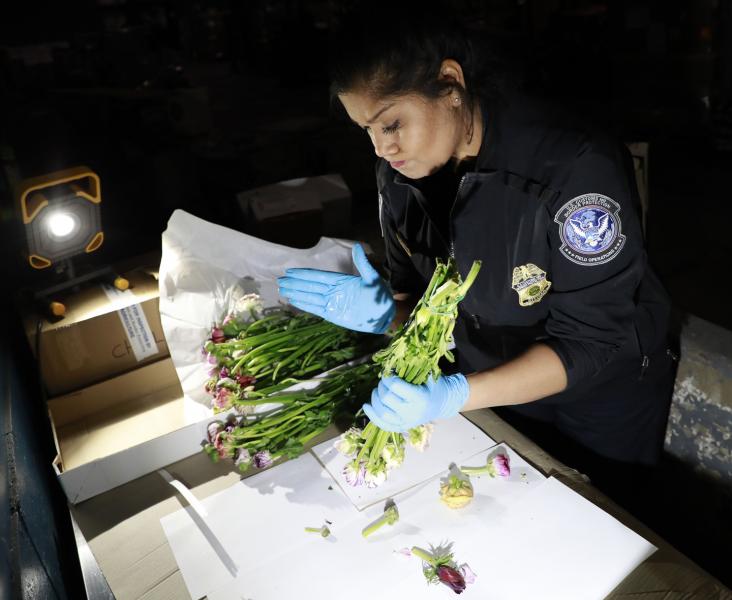BALTIMORE — U. S. Customs and Border Protection’s (CBP) Baltimore Field Office agriculture specialists are working against the clock to ensure all imported Valentine’s Day flowers arrive on time, but most importantly that the flowers arrive free of pests and diseases that could harm our agricultural industry and economy.

Valentine's Day flowers recently at
Washington Dulles International Airport.
The Baltimore Field Office agriculture specialists, working primarily at the Area Ports of Baltimore, Philadelphia and Washington Dulles, have inspected and released more than 5.3 million flower stems during Valentine’s Day season 2019 (January 1 – February 12). Nationally, CBP expects to process more than one billion flowers in time for Valentine’s Day.
The top-5 flowers imported through the Baltimore Field Office are tulip, rumohra, commonly known as leatherleaf fern, hypericum, rose, and dianthus. The top-5 source nations include the Netherlands, Colombia, Ethiopia, Honduras, and Costa Rica. The top-3 inspect pests intercepted on these flowers were aphids, thrips, and mites.
“Customs and Border Protection agriculture specialists are on our nation’s frontline in the fight against the introduction of harmful insect pests and plant and animal diseases into the United States, and the lead-up to Valentine’s Day is an extraordinarily busy time for them,” said Casey Durst, CBP’s Field Operations Director in Baltimore. “CBP is working extremely hard to make sure flowers get to businesses and homes around the country in time for your big day, but doing so in a way that protects America’s agricultural resources and our nation’s economy.”
Imported flowers can carry hitchhiking pests and diseases that could cause millions of dollars in damage to the U.S. flower industry and beyond. While the vast majority of flowers entering the country are safe, even one hitchhiking pest or plant disease could cause significant damage to American agriculture. It’s critically important not only to consumers, but to the vitality of the U.S. economy that cut flower imports are carefully inspected by CBP agriculture specialists.
So far this season, the top ten ports from incoming ports have processed 974 million stems, and intercepted some 1,662 pests.
Miami International Airport is the top-ranked port for cut flower imports with 852.5 million (88 percent of fresh-cut flowers nationwide), followed by Port Everglades, Fla. and Los Angeles International Airport with 24.8 and 16.2 million each, respectively.
The top three types of flower imports to the U.S. during the Valentine’s season are roses, mixed bouquets and rose bouquets. More than 66 percent of the cut flower stems are imported from Colombia, 24 percent from Ecuador, 2.5 percent from Mexico, and 1.7 percent from the Netherlands.
The most commonly intercepted insects discovered on cut flowers are species of aphids, thrips moths, miner flies, and mites.
If pests or diseases are found, the shipments may be treated and released, re-exported, or destroyed.
CBP agriculture specialists have extensive training and experience in the biological sciences and agricultural inspection. Learn more about how CBP protects our nation’s agriculture.
On a typical day nationally, CBP agriculture specialists interdicts 4,638 prohibited meat, plant materials or animal products, and intercepts 352 agriculture pests and diseases. Learn more about what CBP achieves during a “Typical Day.”
CBP's border security mission is led at 328 international ports of entry by CBP officers and agriculture specialists from the Office of Field Operations. CBP uses a variety of techniques to intercept narcotics, unreported currency, weapons, prohibited agriculture, and other illicit products, and to assure that global tourism remains safe and strong. Please visit CBP Ports of Entry to learn more about how CBP’s Office of Field Operations secures our nation’s borders.
Learn more about CBP at CBP.gov.
Download footage and imagery of cut flower inspections through the Defense Video Imagery Distribution System (DVIDS) and CBP Flickr.


